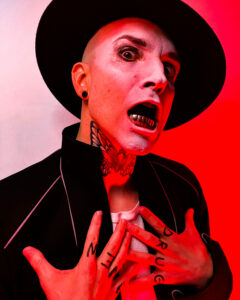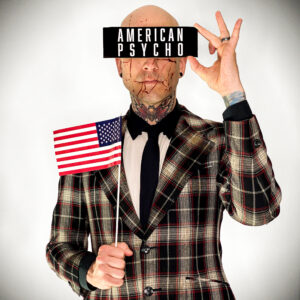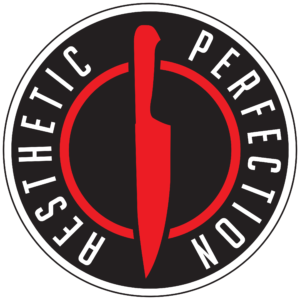Although artists, usually don’t like to be labelled, with the internet the “tags” arrived. Thanks to them, post can be found easier so tagging became something mandatory. In this case, the artist we have interviewed ,Aesthetic Perfection, has, maybe not invented but popularized, a new one, Industrial Pop that we had to add to our list. In this interesting interview, he tells us about what does the genre means to him. If you want to know how Industrial Pop sounds, we recommend that you come to the Belgian beach of Ostend, to the Sinner’s Day Summer Festival where he will be playing on Sunday 26 in, in our humble opinion, the most interesting day of the event.
 —Why did you start Aesthetic Perfection? What motivated you to do it?
—Why did you start Aesthetic Perfection? What motivated you to do it?
—I’ve wanted to be in the limelight ever since I was a little boy. First, I wanted to be Hollywood actor like Tom Cruise, but once I discovered music I decided I’d rather be a pop star like Michael Jackson.
—Are you going to re-record your first album, Close to Human, as you said some time ago?
—I’m absolutely going to re-record Close to Human, I just need to find the time to do it. A lot of bands who re-record albums don’t invest the time necessary to deliver something worth listening to, so it’s important that I do this the right way. I want to use all the gear and plug-ins that I had back in 2004 so it feels as authentic as possible. I’ve promised myself that I will make time in the next 3 years so that it’s ready for the 20 year anniversary in 2025.
—Checking your first album in hindsight, we could say that there is a more pop approach already in some songs like Overcast. Did you already know any other musician in the industrial/dark electro that shared your vision of music? Or just in the industry?
—The thing that I find most amusing about the claims that I “sold out” or “went pop”, is that anyone who knows me, knows that has been the goal since day 1. Industrial Pop has always been the pot of gold at the end of the artistic rainbow for me, and I’ve been striving to reach it for 20 years. I do believe that my vision for the genre is unique in the sense that most people who want to make pop in our world are trying to recreate 80’s pop like Depeche Mode. I’m trying to remain in constant motion and use the most cutting edge technology with the most cutting edge pop production techniques to produce something fresh.
—In 2007, you released a more synth pop album under the Necessary Response moniker with some songs that were already written for the first album, right? Were you more confident singing these songs or the one of the previous and later albums? Why did you decide to re-record it again? Was it because of the production?
—The original cut of “Close to Human” had “Forever”, “Tomorrow” and “Elements” on it. My European label at the time claimed I couldn’t release an album with so many diverse styles, and told me that if I ever wanted those songs to see the light of day I’d need to start a side project. This was very frustrating for me because I was being forced to fit into two separate boxes (Futurepop or Aggrotech) instead of being allowed to create my own box. That’s why I’m always so adamant that I wasn’t part of the Aggrotech or Hellektro movement. I wasn’t. I came out of the third wave of Industrial and wanted to make music that was a mix of N*Sync and Wumpscut.
I was so bitter about the way things played out with Blood Spills… that I abandoned the project and focused on making Aesthetic Perfection into the vision I always had for it. That’s why A Violent Emotion is as clean and poppy as it is. As soon as the rights to Blood Spills… reverted to me, I decided the only way to make peace with that chapter was to re-record the album and release those songs as Aesthetic Perfection, because that’s the project they were written for!
—Now that you mention Violent Emotion, that’s your album from 2008 and the favourite of part of your public. Do you think that some works can become a kind of a load the musician has to carry all his life?
—I consider myself lucky to have an album that people cherish like A Violent Emotion. Most artists would kill to have one classic record in their discography. Many people assume that because I’ve moved on that I’m somehow disrespecting the record or that I’m ungrateful. The truth is: I’ve simply changed! I was 25 when I made that record. I’m nearly 40 now. If I were the same person with the same outlook, beliefs and tastes at 40 as I was at 25, that’d be a sad state of affairs! Life is about growth. We should all be constantly moving and improving. I love what I achieved with A Violent Emotion, I’m just not that person anymore. And that’s okay.
—After that, arrived the difficult step of All Beauty Destroyed, where the two musical worlds collided. Was it understood at the time? You said that you got even threatened by people. Don’t you think some people take music too seriously?
—All Beauty Destroyed was a very difficult period for me. I had the will, I had the ideas, but I didn’t have the skills to properly bring them into the world. It’s true that even if I *had* done that record perfectly, that people would have rejected it because it was so different to A Violent Emotion, but I should’ve been more humble and self-aware. I bit off way more than I could chew. However, the failure of that record is what set me on the path to becoming a better musician and a more thoughtful person. I never wanted to endure that trauma again, so I decided to do whatever it would take to keep that from happening.
Do people take music too seriously? Yes and no. Music is, in my view, the most powerful art form. The musical part, the rhythm and the melodies speak to a very primal area of our psyche. It gets us to free ourselves and move in a way that other artistic disciplines can’t. Combine that with the singing and the lyrics, very often articulate feelings and emotions that the listener can’t articulate for themselves, it becomes their own personal voice. That is, indeed, powerful. I understand why people are so passionate about music. However, I do see hyper fandom as dangerous, and many listeners elevate their favorite artists to the position of gods, instead of remembering that they are flawed human beings. The truth is: Most of us don’t even know what we’re creating. There’s no master plan, it’s just a flow from our subconscious. Sometimes the words are written just to fit a melody, not because they’re the most profound.
—Some musicians try not to listen to music to get influenced, what about you? Do you try to get updated with what’s new in electronic music?
—I try to frame my place in the music world like a comic standing up on a stage. No matter how funny the comic thinks their material is, if the audience isn’t laughing, it’s not fucking funny! A large part of a comic’s job is to read the room and figure out where their comedic voice overlaps with the tastes of the audience. That is my approach to “staying relevant”. I am CONSTANTLY listening to new music. I want to understand what’s on the cutting edge. I want to know what’s popular and why. I want to figure out how my voice fits into the current moment. So yes, I am 100% influenced by what I listen to… and that’s intentional.
—With ’Till Death, you arrived at industrial pop, let’s say your own style. What were your main influences to arrive there?
 —’Til Death was certainly a turning point. I felt like I had finally made a record that was truly different from everything else going on in the dark scene. Perhaps it was too different? Only history can say.
—’Til Death was certainly a turning point. I felt like I had finally made a record that was truly different from everything else going on in the dark scene. Perhaps it was too different? Only history can say.
That record was heavily influenced by the Top 40 music of the time. Lady Gaga, Rihanna, Timberland… I was fascinated by the production of those artists and did my best to transpose it onto my own record. I also really wanted to create something whimsical and dreamy, akin to The Birthday Massacre or the Vices and Virtues record by Panic! at the Disco. I was finally learning how to really sing, so I pushed myself as far as I was capable of at the time. The last important aspect of that record is the dubstep influence. I was *really* into dubstep, but I had the foresight (thank god) to recognize that the wobble bass was a trend that would die very quickly and date my record if I dared to incorporate it. I chose to ONLY take influence from the drum production. Which I think is pretty evident on tracks like “Dark Half” in the breakdown and “The New Black” and its halftime chorus.
—About Into The Black, you said that you felt like it was the first record you’ve ever done that came close to the original vision you had in mind. I guess it’s like when Stevie Wonder released his Music of My Mind. What do you think helped you achieve that?
—Practice is really the only way to learn how to turn the vision you have in your mind into a tangible piece of work in the real world. The more I do this, the better I get, and the closer my finished works are to what I dreamt they would be. It’s a pot of gold at the end of a rainbow scenario, though, there is no end point, there’s always more to learn. That’s why I say “practice makes progress” instead of “practice makes perfect”
—It was also the first time you collaborated with other songwriters, how was the experience?
—It can be hard to set your ego aside and let other artists bring their ideas into your work, especially when you’ve been working solo for as long as I have. I think I needed to reach a certain level of maturity before it became something I was ready for, but once I did it opened a whole new world for me. I love collaborating now. It’s a real joy.
—How personal are your lyrics? Do you think it’s possible to really know you through them
—My lyrics are deeply personal, and if you were able to read them without having to filter them through the lens of your own perspective, you’d probably be able to know a lot about me. However, you’re not able to do that. Words and phrases and concepts and images trigger memories and feelings and connections from your own life, a life I’ve never lived, which means that my lyrics don’t really help you understand me… they help you understand yourself.
—Deadbeat is your remix moniker, how is your approach to remix?
—Remixes are easy. I usually don’t even bother listening to the original song. I just load up the tracks and hit play, as soon as I hear an element I like, I single that out, trash the rest, and build an entirely new idea around that one element. Basically, I just write a new track around a seed of an idea.
—You moved from the US to Austria. How has your life changed with this? And your music?
—It’s hard to know how life’s events will influence you, both on a personal level and an artistic one. When you’re smack in the middle of a situation, you don’t have the luxury of an outside perspective. Ask me again in a few years, maybe I’ll have some more insight!
—You said that you are a fan of pop music, but what is pop in 2021? Divas? Trap? Reggaeton? Do you know the band Wackelkontakt? They mix industrial with these new urban styles.
—As I mentioned above regarding dubstep, the trick is to really think about the more subtle elements that inform a genre, rather than the more obvious ones. Of course, some more obvious things like the “millennial whoop” that made its way into “We Wake Up” or the trap / rap “Dark Ages”, I think a lot of my current material reflects modern sounds without being too on the nose. “Love Like Lies” isn’t a trap song but it’s only 92 bpm and has trap hi-hats. “Gods & Gold” isn’t dubstep but it’s got halftime dubstep drums and a double time final chorus like radio rock. The key is to simply weave elements of the current moment into what it is that you do so it feels fresh, without feeling inauthentic.
—Also, what is industrial music for you? You said “It’s ironic that a scene with such rebellious roots would grow into something so stagnant and predictable.” Could you name some industrial artists who, according to you, are keeping the values of the style?
—In general it’s very rare to find a band who is willing to risk their career to try something new. It’s just not what’s done in this day and age. I’m not self-congratulatory by nature, but I will give myself credit for being willing to fail. I never consider the commercial implications of my artistic intuitions. For me, that’s really what industrial was about from the beginning. We just don’t have many bands like Skinny Puppy or My Life with the Thrill Kill Kult or Ministry who just change completely with every single album. I wanna see a band come into the scene, drop a grenade on the whole thing and just walk away. In my humble opinion, that’s what industrial is about.
—Your last challenge was to release a single every month. These singles are contained in your last album MMXXI. You said that it was quite difficult. What was the difference with recording a normal album?
—With MMXXI I wasn’t trying to tell a story or keep any kind of consistency throughout the project. It’s as musically diverse as it is thematically. Which, in a way, made it much easier, because I had zero limitations, but limitations can also keep you focused. I definitely want to make a more focused album now, but I’m sure while doing it I will feel restricted. There’s always a tension there between having too much freedom and too little.
 —”Happy Face” is about the depression you got a few years ago. Did it help to write about it?
—”Happy Face” is about the depression you got a few years ago. Did it help to write about it?
—Writing lyrics is how my brain articulates whatever it is that’s going on in my subconscious. It’s really a method of forcing my conscious self to understand the things it cannot otherwise face. I typically write in a stream-of-conscious fashion, and when I stumble upon something meaningful, I get this little flutter in my body, like one feels when you fall in love. That’s how I know what I’ve found is true. When something is finished, I look back and wonder what it is my subconscious was trying to reveal to me. With “Happy Face” it showed me how close I really came to committing suicide. Before that moment, I wasn’t even aware of how bad it had gotten. I had denied it to friends and family, and most of all, myself.
—In the latest years, vinyl has become more and more popular. Has your point of view about albums changed with this?
—You can press vinyl singles, too, you know! Here’s the thing: I prefer albums. I always have. I’ve always been clear about that. The problem is that artists need to adapt with the times, and understand how to speak the language of the Zeitgeist in order for their work to be seen or heard or appreciated. I don’t do singles because I think they’re better than albums, I do them because that’s just what the world wants right now!
—You run your own label /distribution company in the past. Have you thought of releasing other people’s music and maybe skip the mistakes of the music industry?
—I founded Close to Human Music not only as an imprint for my own work, but as a vehicle for other artists as well. So far, I only released the “Voodoo” single by Nyxx. It’s not that I don’t want to do more, it’s that I don’t have the time, resources or mental bandwidth for it. Perhaps, one day, if I get an assistant or something, I can realize this long-standing dream of helping other artists.
—How is your Patreon page going? Do you believe in a model where labels can be replaced by the support of fans?
—Labels are dead. They are useless. The only situation where an artist should sign with a label is if they have aspirations of widespread fame and partner with a major label in order to do so. Indie bands don’t need ever need a label. Personally, Patreon was the best decision I ever made for my career. Not only does it keep Aesthetic Perfection financially independent, it allowed me to create a community for my core audience where they can not only interact with me, but with one another.
—You are quite active on social media and have an active YouTube channel where your present videos. How important is the feedback of your fans for you?
—Creating art is about having a conversation with the world. This idea that artists should simply exist independently of the Zeitgeist is arrogant and absurd. I listen to my audience and think about how I can more effectively communicate the ideas. That doesn’t always mean giving the audience what they want, though. Tension is an important factor of creating interesting and engaging work. That’s why I very often tell my audience “no”. But I certainly understand the consequences of saying “no”… and that’s because I listen.
—Most of your music now is “pay what you want” (since the pandemic, right?). Do you think it’s right now the best way of reaching people? Would you advise other musicians to do the same?
—If there was a single path forward that worked for every artist and every band, we’d have come up with a perfect recipe for success by now. I only know what works for *me*, and I chose many years ago to stop trying to fight the digital revolution. Music isn’t worth what was in the past, that’s okay, the world has changed, and I’m okay with changing with it. If others aren’t okay with that, and find their own way to reconcile the current state of the industry then I am happy for them.
—What can we expect of the future of Aesthetic Perfection? What happened with the Industrial Pop Festival ?
—Corona threw a wrench in a lot of plans over the last two years. The “Industrial Pop Festival” was one of them. Never fear, though, it will be taking place in Spring 2023!
—What can we expect of your concert at Sinner’s Day?
—A good time.




